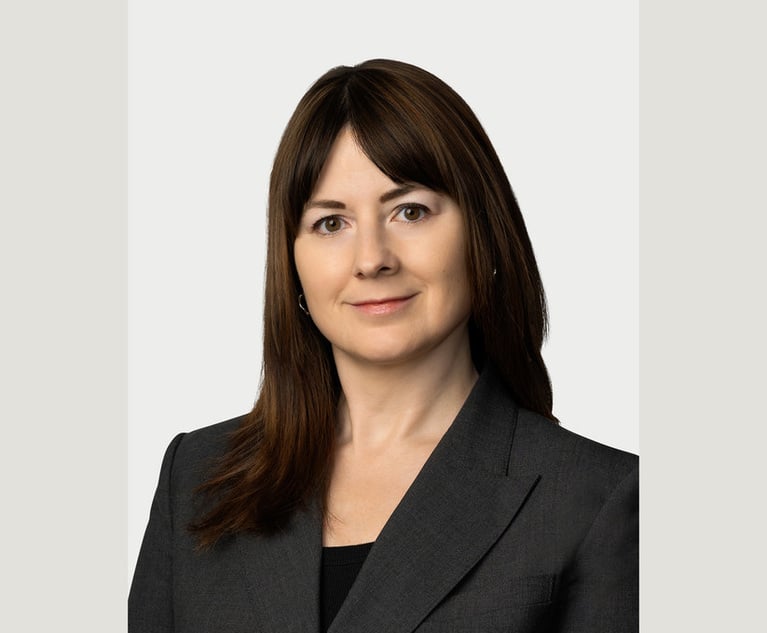This Insider Says It's Time for Big Changes in California's Legal Industry
"Obviously there are still some challenges for the bar, but the inability of so many people to use legal services in California is getting worse," Joanna Mendoza says.
November 27, 2019 at 01:35 PM
7 minute read
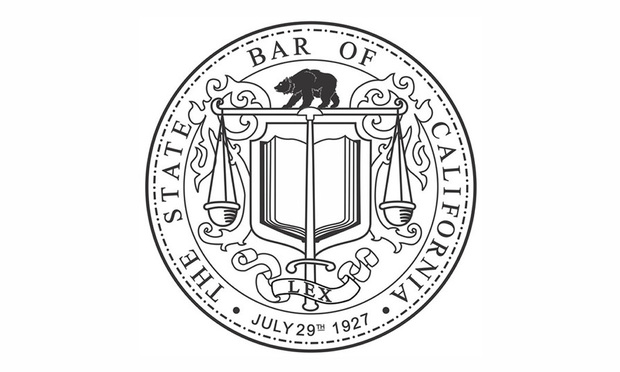 State Bar of California's logo.
State Bar of California's logo.
Roseville attorney Joanna Mendoza may be winding down her law practice but she still finds herself at the heart of a legal debate.
Mendoza serves on a state bar committee charged with recommending ideas for increasing the availability of legal services to all Californians, not just those who can afford lawyers. Some of the group's proposals so far—fee-sharing, allowing nonlawyers to own law firms, using artificial intelligence—have proven controversial. A recent public comment period on the options drew almost 2,900 responses, many of them critical.
Mendoza, a former six-year state bar trustee, is not deterred.
"This is a big shift in the legal industry in the United States. It's starting to catch fire," she said in a recent interview with The Recorder. "It's probably going to take a number of years to get anywhere, but I'm hopeful that because of the amount of momentum that we're seeing right now, it will happen. And it will eventually happen throughout the United States."
Mendoza recently spoke with The Recorder about the committee's work and why she thinks structural changes to the practice of law in California need to happen now. The interview is edited for length and clarity.
The Recorder: What prompted the creation of this task force and its mission?
Mendoza: I go back to the splitting up of the bar because before we separated out the trade association functions it tended to be fairly attorney-focused. The split allowed the board and the organization to look at issues such as the access-to-justice crisis that we have in the country and in California in particular.
With all the structural changes the bar has undergone lately, is this the right time for the bar to be taking up these big issues?
Obviously there are still some challenges for the bar, but the inability of so many people to use legal services in California is getting worse. And these changes that we are looking at are going to take a long time to implement. If we put them off, it's just going to be a bigger crisis by the time things are actually implemented. We're actually working against the mission if we put it off.
Are any issues the task force has looked at that have gained traction?
The main changes, the ones that are the most controversial, also seem to have the most support among the task force members who have been studying them and the community of legal aid people who are seeking change.
 Joanna Mendoza
Joanna MendozaOne would allow people who don't have a license to practice law engage in other forms of legal service practices under a regulatory scheme, similar to what doctors have with nurse practitioners. There are many levels of services that are allowed in the medical field, and we're looking at something similar in that respect for accessibility and for price.
Another thing that has a lot of support is allowing technologies to serve people without a fear of someone being hit with an unauthorized practice of law. In order to allow innovation, we need to allow non-attorney-owned entities to engage in certain types of legal services. They would be regulated. And we need to identify what they are. But we want to make sure we kind of come of age in the legal industry by allowing these things. Not everything has to be a one-on-one, person-to-person service.
What is the evidence that these changes will increase access to legal help?
We know the status quo is not working and that the problem is continuing to grow and that there's not enough attorneys to fill that gap. We could never fill that gap with attorneys in legal aid. It's just impossible. So we have to be able to try things that we haven't done to address it.
If it doesn't work, it doesn't work. But it's not likely to make things worse. And right now doing nothing is making things worse.
How does allowing nonlawyers an ownership stake in law firms help?
It goes toward creating an environment of innovation and efficiency in legal services. Lawyers are not trained businesspeople. They are in the profit-making business and they tend to split all their profits at the end of the year.
Allowing people who are nonlawyers, other professionals who have experience and skills that lawyers don't have, that would allow efficiencies, that would still allow money to be made but could reduce the cost to the consumer of those services.
Were you surprised by the level of pushback these ideas have received?
Not in the least. I harken back to my experience on the board [of trustees] when we rolled out the re-fingerprinting rule, and we got the same thing. There's initially a failure to understand the role of the bar, that it's not there for lawyers, that it's there to protect the public and consumers and look out for their best interests first.
It's the same thing now. A lot of attorneys seem to think that the bar should be looking out for the attorneys and not what's best for the consuming public. And without studying the issue—because it takes a tremendous amount of reading, a tremendous amount of time to really understand these things—there tends to be a gut reaction and a fear associated with change.
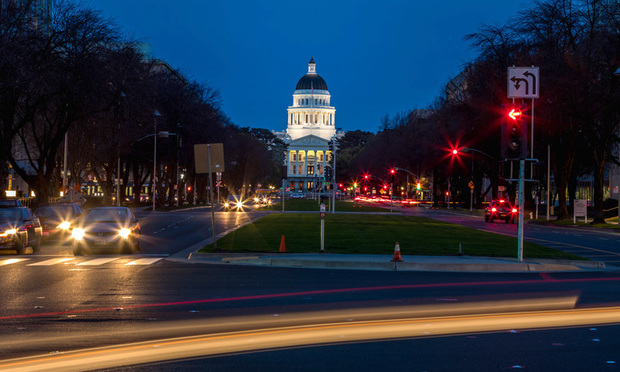 Sacramento State Capitol building on Capitol Way. Credit: Jason Doiy/ALM
Sacramento State Capitol building on Capitol Way. Credit: Jason Doiy/ALMHow confident are you that the changes under consideration by the task force would be accepted by the Supreme Court and the Legislature?
Again, it's going to be about education. There has been a lot of concern raised about notarios and the harm to the immigrant community. Of course, one of the issues associated with that is that, other than going to an immigration lawyer, there's no alternative out there for immigrants, unless they happen to get legal aid.
The Legislature, I think, would be interested in how these changes would impact their constituents. And if we could educate them on how they would help improve the lives of their constituents, I think we could get there.
Our court tends to be more conservative when it comes to change. Sometimes the pressure needs to come from an outside source, such as the Legislature, to engage in those changes. I'm hoping it won't be necessary.
You're very passionate about this work. Why does it personally mean so much to you?
Probably a lot of it is my background. I came from a lower economic background, lived in government housing. My parents went through a divorce at a very young age. My mother was paying for her attorney 10 years after that, which she couldn't afford because we were in government housing, on food stamps. It was very difficult.
I know I've given a lot of low-cost legal services to the independent film community in Sacramento because they can't afford a lawyer. And it makes all the difference to have a simple contract for something. But that's because I wanted to help. There are just so many people out there that you can't help. This is one way to actually help a lot of people, and the fact that I'm privileged enough to be in a position to do that makes it worthwhile.
Read more:
California Lawyers Slam Bar Proposals for Fee-Sharing, Nonattorney Ownership
California Plan for Lawyer Fee-Sharing Picks Up Speed
New Law Blocks State Bar's Access to Applicants' Mental Health Records
California's Indigent Are Not Finding Legal Help, Bar Study Says
This content has been archived. It is available through our partners, LexisNexis® and Bloomberg Law.
To view this content, please continue to their sites.
Not a Lexis Subscriber?
Subscribe Now
Not a Bloomberg Law Subscriber?
Subscribe Now
NOT FOR REPRINT
© 2025 ALM Global, LLC, All Rights Reserved. Request academic re-use from www.copyright.com. All other uses, submit a request to [email protected]. For more information visit Asset & Logo Licensing.
You Might Like
View All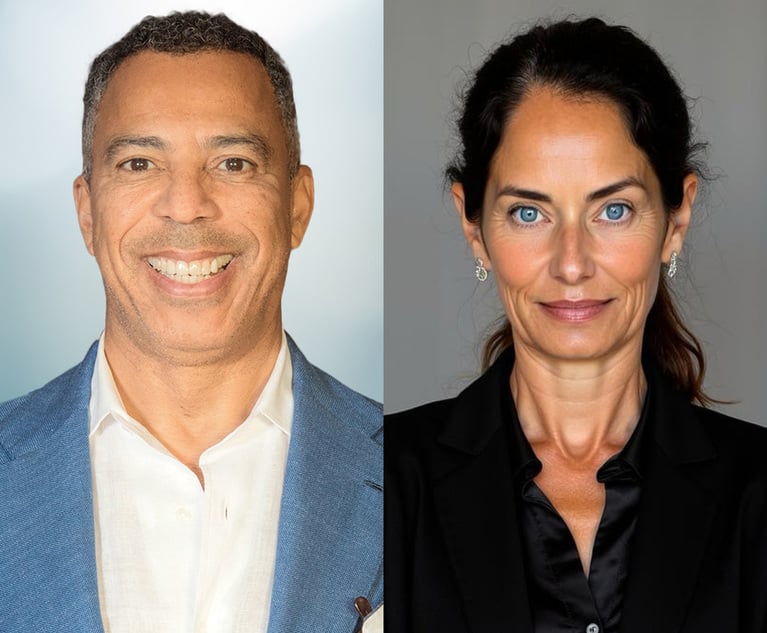
Growth of California Firms Exceeded Expectations, Survey of Managing Partners Says
5 minute read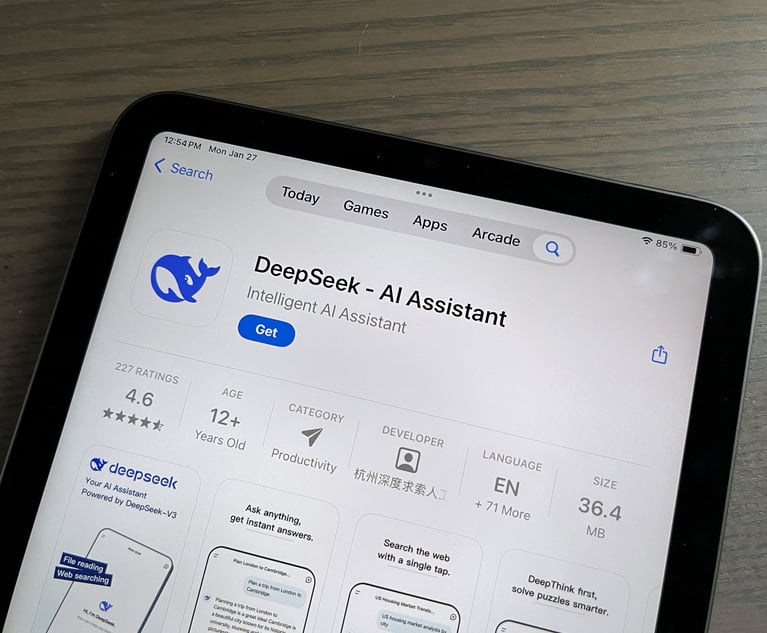
The Time Is Now for Employers to Assess Risk of Employees’ Use of DeepSeek
4 minute read
Loopholes, DNA Collection and Tech: Does Your Consent as a User of a Genealogy Website Override Another Person’s Fourth Amendment Right?
Trending Stories
Who Got The Work
J. Brugh Lower of Gibbons has entered an appearance for industrial equipment supplier Devco Corporation in a pending trademark infringement lawsuit. The suit, accusing the defendant of selling knock-off Graco products, was filed Dec. 18 in New Jersey District Court by Rivkin Radler on behalf of Graco Inc. and Graco Minnesota. The case, assigned to U.S. District Judge Zahid N. Quraishi, is 3:24-cv-11294, Graco Inc. et al v. Devco Corporation.
Who Got The Work
Rebecca Maller-Stein and Kent A. Yalowitz of Arnold & Porter Kaye Scholer have entered their appearances for Hanaco Venture Capital and its executives, Lior Prosor and David Frankel, in a pending securities lawsuit. The action, filed on Dec. 24 in New York Southern District Court by Zell, Aron & Co. on behalf of Goldeneye Advisors, accuses the defendants of negligently and fraudulently managing the plaintiff's $1 million investment. The case, assigned to U.S. District Judge Vernon S. Broderick, is 1:24-cv-09918, Goldeneye Advisors, LLC v. Hanaco Venture Capital, Ltd. et al.
Who Got The Work
Attorneys from A&O Shearman has stepped in as defense counsel for Toronto-Dominion Bank and other defendants in a pending securities class action. The suit, filed Dec. 11 in New York Southern District Court by Bleichmar Fonti & Auld, accuses the defendants of concealing the bank's 'pervasive' deficiencies in regards to its compliance with the Bank Secrecy Act and the quality of its anti-money laundering controls. The case, assigned to U.S. District Judge Arun Subramanian, is 1:24-cv-09445, Gonzalez v. The Toronto-Dominion Bank et al.
Who Got The Work
Crown Castle International, a Pennsylvania company providing shared communications infrastructure, has turned to Luke D. Wolf of Gordon Rees Scully Mansukhani to fend off a pending breach-of-contract lawsuit. The court action, filed Nov. 25 in Michigan Eastern District Court by Hooper Hathaway PC on behalf of The Town Residences LLC, accuses Crown Castle of failing to transfer approximately $30,000 in utility payments from T-Mobile in breach of a roof-top lease and assignment agreement. The case, assigned to U.S. District Judge Susan K. Declercq, is 2:24-cv-13131, The Town Residences LLC v. T-Mobile US, Inc. et al.
Who Got The Work
Wilfred P. Coronato and Daniel M. Schwartz of McCarter & English have stepped in as defense counsel to Electrolux Home Products Inc. in a pending product liability lawsuit. The court action, filed Nov. 26 in New York Eastern District Court by Poulos Lopiccolo PC and Nagel Rice LLP on behalf of David Stern, alleges that the defendant's refrigerators’ drawers and shelving repeatedly break and fall apart within months after purchase. The case, assigned to U.S. District Judge Joan M. Azrack, is 2:24-cv-08204, Stern v. Electrolux Home Products, Inc.
Featured Firms
Law Offices of Gary Martin Hays & Associates, P.C.
(470) 294-1674
Law Offices of Mark E. Salomone
(857) 444-6468
Smith & Hassler
(713) 739-1250





